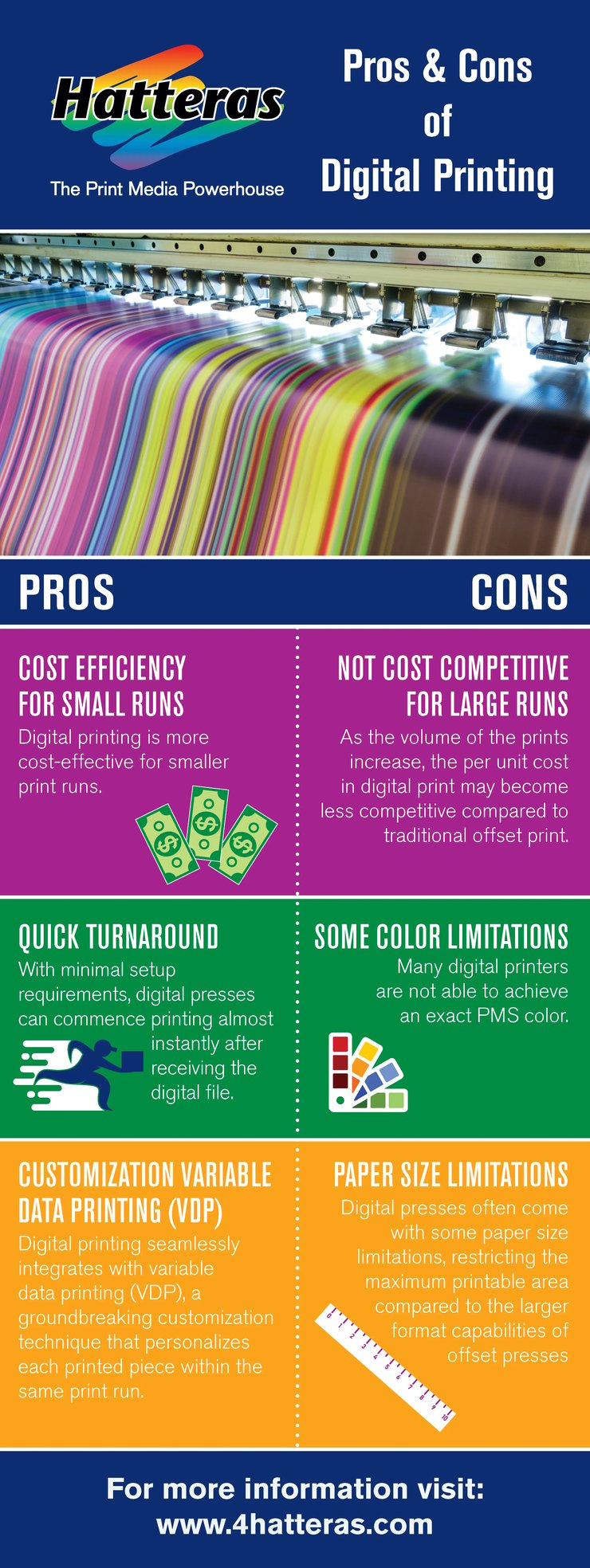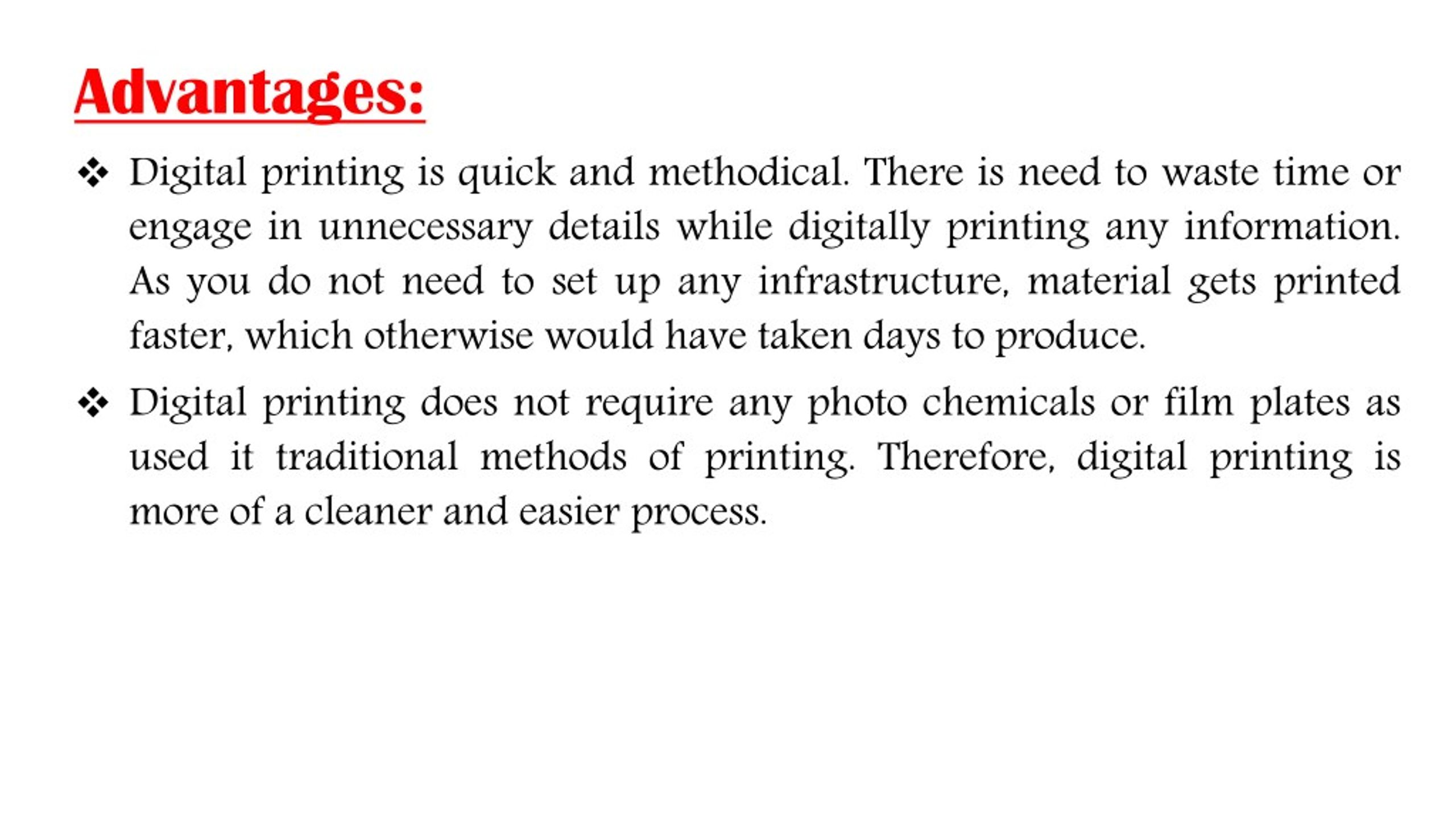Digital Printing - An Overview
Digital Printing - An Overview
Blog Article
The Best Guide To Digital Printing
Table of ContentsUnknown Facts About Digital PrintingThe 4-Minute Rule for Digital PrintingAll about Digital PrintingFacts About Digital Printing RevealedFascination About Digital Printing10 Easy Facts About Digital Printing Described
Variable data printing, such as direct mail with customized codes and addresses, is preferably fit for electronic printing. Digital quick printing just needs 4 actions of design, evaluation, printing and binding to obtain whatever done. Digital fast printing has an unequaled advantage: print on demand.According to PMMI, digital printing enables brand names and suppliers to react swiftly to client demands while enhancing the supply chain, lowering warehousing price and waste, and taking pleasure in faster time to market. That all audios great, but how does this technology do all that? The significant differentiator of these innovations is that there are no set-up fees and no plates with digital printing.
Get This Report about Digital Printing
According to Wikipedia, the best difference in between digital printing and typical approaches such as lithography, flexography, gravure, or letterpress - Digital Printing is that there is no demand to replace printing plates in electronic printing, whereas in these analog printing approaches home plates are repetitively replaced. This results in quicker turn-around time and decreases price when using electronic printing.
Digital printing is extremely flexible, so it's easy to make changes to the package layout rapidly. It all goes back to the plates.
Much more supply can indicate more waste in the future. With standard printing techniques, short-run printing is just not feasible. Since a wonderful style can make or break your product, electronic printing regularly creates top notch, clear and vivid graphics each time. Digital printing on versatile pouches includes the brilliant, lively, and specific graphics that almost bid consumers to connect and touch them.
Digital printing is the procedure of printing digital-based pictures directly onto a variety of media substratums. There is no demand for a printing plate, unlike with countered printing. Digital data such as PDFs or desktop publishing files can be sent directly to the digital printing press to publish on paper, photo paper, canvas, fabric, synthetics, cardstock and other substratums.
4 Easy Facts About Digital Printing Explained
According to PMMI, electronic printing allows brand names and manufacturers to respond promptly to client demands while boosting the supply chain, reducing warehousing expense and waste, and taking pleasure in faster time to market. That all sounds great, however how does this modern technology do all that? The major differentiator of these modern technologies is that there are no set-up costs and no plates with digital printing.
This results in quicker turn-around time and decreases cost when using digital printing.

Unknown Facts About Digital Printing
With traditional printing techniques, short-run printing is just not feasible. Due to the fact that a terrific design can make or damage your item, digital printing consistently develops top notch, clear and vivid graphics each time.

According to PMMI, digital printing enables brands and manufacturers to respond rapidly to customer needs while improving the supply chain, lowering warehousing cost and waste, and delighting in faster time to market. That all sounds wonderful, yet just how does this modern technology do all that? The significant differentiator of these modern technologies is that there are no set-up costs and no plates with electronic printing.
The Definitive Guide to Digital Printing
According to Wikipedia, the greatest difference in between digital printing and traditional approaches such as lithography, flexography, gravure, or letterpress is that there is no need to replace printing plates in digital printing, whereas in these analog printing techniques home plates are repetitively replaced. This leads to quicker turn-around time and decreases cost when utilizing electronic printing.
Digital printing is very adaptable, so it's simple to make modifications to the bundle layout quickly. It all goes back to the plates.

Some Known Incorrect Statements About Digital Printing
Digital printing is the procedure of printing digital-based photos straight onto a range of media substrates. There is no demand for a printing plate, unlike with countered printing. Digital data such as PDFs or desktop computer publishing data can be sent straight to the electronic printing machine to publish on paper, image paper, canvas, fabric, synthetics, cardstock and other substratums.
Report this page